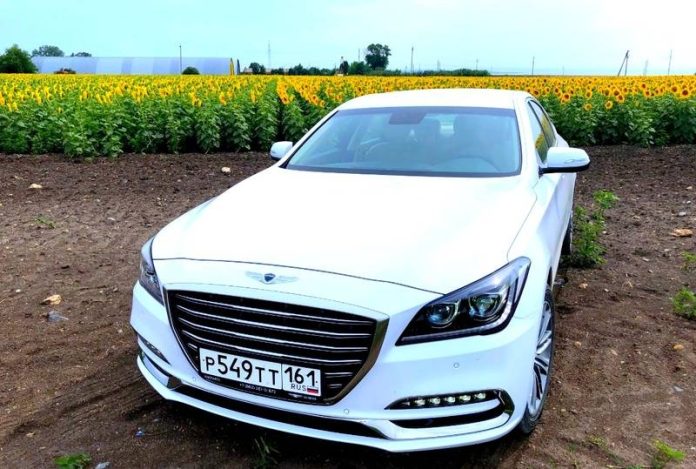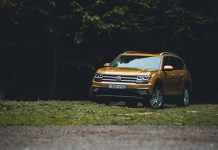In the mass segment, Korean brands’ models sell in the millions around the world. This is pushing Koreans to try their hand at the premium class, where Germans traditionally have a strong position. Using the example of the mid-size Genesis G80 sedan, we explain why it’s good, but it’s still too early to compete in coolness with the BMW 5 Series or Mercedes-Benz E-Class .
Exterior
At first glance, the “eighty” gives the impression of a large and respectable sedan, but without any special flair. The G80 is the foundational model for the Genesis brand, on which the company relies in the battle for the hearts of buyers. The car’s exterior does not seem impressive. This five-meter-long car with a large grille, LED headlights, and 18-inch wheels looks impressive, but there’s nothing particularly arresting.

It seems the car simply lacks a distinct personality, and the gazes of passersby and neighboring traffic aren’t drawn to it. It looks more utilitarian than stunningly attractive. Like a country boy who moved to the city, graduated from university, and rose to the rank of department head in a large company, donning a nice suit, but will never become a top manager because he’s neither particularly daring nor ambitious. That’s roughly how you’d describe our hero today. It’s good, but its simplicity gives it away, even though it’s swapped its original Hyundai name for the more striking Genesis moniker.

The G80’s appearance is generally copied from its more famous competitors. Just look at the wide Audi-style grille or the Infiniti-style headlights. The car looks good, but it doesn’t make passersby turn their heads. In city traffic, the Genesis G80 doesn’t seem to receive any respect from other drivers. Look, some Renault Logan is trying to squeeze in front of you, and then a taxi driver in a related Hyundai Solaris is just trying to cut you off…

The problem is that the car’s appearance is too dull and unaggressive, and other drivers can’t figure out what kind of “unknown beast” is in front of them. Genesis doesn’t yet have the brand power and magic that would make it a desirable car; the vague emblem with wings seems incomprehensible – part Aston Martin, part Bentley. As a result, you are perceived as driving some kind of “Chinese” car, and not a luxury car from Hyundai.

Interior
The Genesis G80 is spacious not only in the back seat, but also in the driver’s seat. Fully electric seats with memory for two drivers turned out to be more comfortable than one might expect at first glance.
The interior is finished with pretentiousness – Nappa leather, aluminum, wood with a matte finish. There are five color combinations to choose from; our car had a beige interior with wood inserts on the center console. Everything seems fine, but this faux wood veneer adds simplicity to the entire G80 interior. The center console is angled slightly toward the driver. The driving position is comfortable, but if you’re of average build and choose a deep seating position, you’ll have to reach for the central touchscreen. The multimedia system itself feels a bit archaic. The screen lacks multitouch, and the graphics are pleasant, but the image fades in bright light, and the navigation is a bit complicated.

After the restyling, the sedan received a new, easy-to-use, non-locking eight-speed automatic transmission lever. The dashboard is simple and easy to read, and higher-end trims include a head-up display. The mirrors are power-folding, and all windows have automatic modes and soft-close functions. The top-of-the-line seat’s power controls are supplemented by a cushion extender. The standard seats are electrically heated, but not ventilated. If you want more, be prepared to pay significantly more.

How it drives
We got the Advance trim level for testing with a two-liter turbo engine producing 245 horsepower. This is the mid-range engine that is installed on the Genesis G80. The engine produces 245 horsepower – specifically to please the transport tax. The base trim level of the G80 will have a two-liter engine with 197 horsepower. But the top-end version is a V6, 3.3 liters and a power of 370 horsepower. But in the Russian Genesis office they are betting on the 245-horsepower engine, as the golden mean and the most popular trim level. In the city, the G80 feels comfortable behind the wheel. The car is large, but its dimensions are felt perfectly and do not create discomfort during maneuvering. To save fuel in city traffic jams, the car is equipped with a start/stop system. Parking in a confined space is easy. Our model comes with a rearview camera with active on-screen markings and only one parking sensor. Higher-end versions of the G80 will feature a 360-degree camera, blind-spot monitoring, and parking sensors on all sides, making maneuvering significantly easier. However, even with a single rearview camera, parking is straightforward.

The G80’s suspension deserves praise in city driving conditions; it’s well-balanced. It’s both firm and comfortable. The suspension effortlessly soaks up uneven asphalt, tram tracks, and speed bumps, without causing discomfort to those inside. The Genesis wasn’t particularly enjoyable on country roads. It rolls smoothly and leisurely, but for a two-ton vehicle, 245 horsepower is clearly underpowered. This is especially noticeable when driving uphill. You have to floor the gas pedal to pass trucks lining up one after another. You have to rev the engine with the steering wheel paddle shifters, downshifting. The Genesis G80 is the only model in its class that comes standard with all-wheel drive.

During summer driving on dry pavement, I was unable to get the car to skid. The electronics suppress any attempts at aggressive driving. Generally speaking, abrupt maneuvers and quick turns on the highway aren’t the Genesis G80’s thing, at least not with the 245-horsepower engine. The Korean premium car will likely perform better with a V6 engine. The electric power steering makes the steering feel a bit overweight and not quite as responsive. The Genesis G80 is, however, more for those who are used to riding on the back seat rather than getting behind the wheel.
How much does all this cost and who needs it?
Although Genesis still positions itself as a premium brand, it is still a well-finished Hyundai, and the Koreans have not yet managed to jump above their heads. The Genesis G80 in its mid-range configuration could compete with a well-equipped Toyota Camry with a 2.5-liter engine, but the Koreans are still far from German or Japanese premium.

The base configuration of the Genesis G80 will cost 2,790,000 rubles, which is 300-400 thousand less than its competitors from the big German three. The most expensive G80 trim with a V6 engine starts at 4,265,000 rubles. Again, it’s important to remember the brand’s magic, which Genesis simply lacks. Such a car, bought new, will rapidly lose value. And after two or three years, its value could be half its original price. The Genesis brand remains unpopular in Russia, with few buyers. Last year, the Korean company sold 1,831 Genesis vehicles in Russia, more than half of which were the G80. By comparison, BMW sold 3,119 vehicles in May alone, and Mercedes-Benz even more. So far, even with an attractive price, the Koreans have not been able to gain a foothold in the premium segment.









